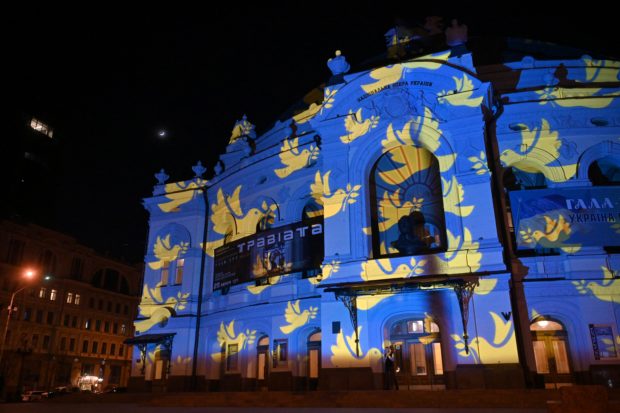
A light installation by Swiss artist Gerry Hofstetter is projected on the main Post Office building in Kyiv on February 23, 2023, on the eve of first anniversary of the Russian invasion to Ukraine. AFP
PARIS — On February 24, 2022, Europe wakes up to a war on its eastern flank as Russia invades neighboring Ukraine, sparking the worst conflict on the continent since World War II.
After weeks of speculation about President Vladimir Putin’s intentions following a massive troop build-up on the border, AFP reports in a high-priority alert shortly before 6:00 am (0300 GMT): “Russia’s Putin announces a ‘military operation’ in Ukraine”.
‘Full-scale invasion’
In a television address Putin says he aims to demilitarize and “de-Nazify” Ukraine, reiterating his unsubstantiated allegation that Ukrainian forces are carrying out a “genocide” in breakaway pro-Russian territories in the east.
He warns Western countries against coming to Ukraine’s assistance, saying they face unforetold consequences.
Ukraine’s Foreign Minister Dmytro Kuleba accuses Putin of launching a “full-scale invasion”.
Explosions ring out across the country, from the capital Kyiv to the Black Sea port of Odesa and Kharkiv on the border with Russia.
Within hours, Ukrainian border guards announce that Russian ground forces backed by tanks and other heavy equipment have crossed into Ukraine from the north, south and east.
As air raid sirens blare, a deeply shaken Ksenya Michenka whisks her teenage son and their cat to the safety of an underground metro station off Kyiv’s historic Maidan Square.
“We need to save our lives,” she says tensely.
Flights over Ukraine and from cities in southern Russia are cancelled.
Ukrainian President Volodymyr Zelensky imposes martial law, preventing men of fighting age of leaving the country.
Shockwaves and sanctions
International condemnation is swift, with US President Joe Biden saying “the world will hold Russia accountable”.
He calls Zelensky, vowing “support and assistance”, addresses the American people, and announces the US and Group of Seven biggest economies will impose “devastating” economic sanctions on Russia.
He vows to defend “every inch” of Nato territory but reiterates that the US, which is wary of being drawn into direct conflict with Russia, will not send troops to non-Nato-member Ukraine.
Oil prices break $100 for the first time in more than seven years at the start of a day in which prices for aluminum, of which Russia is a key producer, and wheat, of which Ukraine is a top grower, reach record highs.
The Russian ruble falls nine percent against the dollar several hours after the invasion.
In the afternoon Nato chief Jens Stoltenberg says the alliance is activating its “defense plans” for members.
EU leaders impose stinging sanctions targeting Russia’s financial, energy and transport sectors.
China goes against the tide of international condemnation, telling Russia’s foreign minister it understands Moscow’s “reasonable concerns on security issues” in Ukraine.
Air superiority
Russia moves quickly to try hobble Ukraine’s defense capabilities, claiming to have destroyed more than 70 military targets, including 11 airfields.
Ukraine, meanwhile, says it has downed five Russian planes and a helicopter.
In the eastern town of Chuguiv, AFP sees a man in his thirties weeping over the body of his father who was killed in a missile strike and meets Olena Kurilo, a 52-year-old teacher, her face covered in bandages from flying glass.
Kurilo, whose bloodied features become one of the iconic images of the war, tells AFP she “never thought” that Russia would invade Ukraine but is ready to resist.
“Never, under any conditions will I submit to Putin. It is better to die,” she says.
Zelensky stays in Kyiv
Russian forces break in the early afternoon into the region north of the capital Kyiv, attacking Ukrainian positions with Grad missiles.
Some of the fiercest fighting takes place at Gostomel airfield to the northwest of Kyiv, which is occupied by Russian forces but later recaptured by the Ukrainians.
A US defense official says Russia appears intent on “decapitating” Ukraine’s government and installing a pro-Russian regime in its place.
Zelensky makes the first in a series of dramatic self-shot videos from Kyiv, vowing to stay and defend the country.
In the evening Ukraine announces that after a fierce battle Russian forces have captured the Chernobyl nuclear power plant, which suffered a catastrophic meltdown in 1986.
Reaction and refugees
Poland opens nine reception centers along its border with Ukraine to prepare for what will turn out to be the biggest movement of refugees since World War II.
Giant tailbacks form on roads leading west out of Kyiv towards the Polish border.
Putin begins a clampdown on opposition to the war at home, with more than 1,400 anti-war protesters arrested in Moscow and St Petersburg.
The first signs of disapproval come from the world of sports, with the International Olympic Committee harshly criticizing Russia for violating the “Olympic Truce” for the Beijing Winter Games.
By the end of the first day of fighting, at least 137 military and civilian Ukrainian “heroes” have been killed and 317 wounded, according to Zelensky.
The UN refugee agency says some 100,000 people have been displaced, thousands of whom have fled abroad.
RELATED STORIES
War in Ukraine drags into second year, Russia isolated in UN vote
Ukraine unveils banknote for anniversary of Russian invasion

